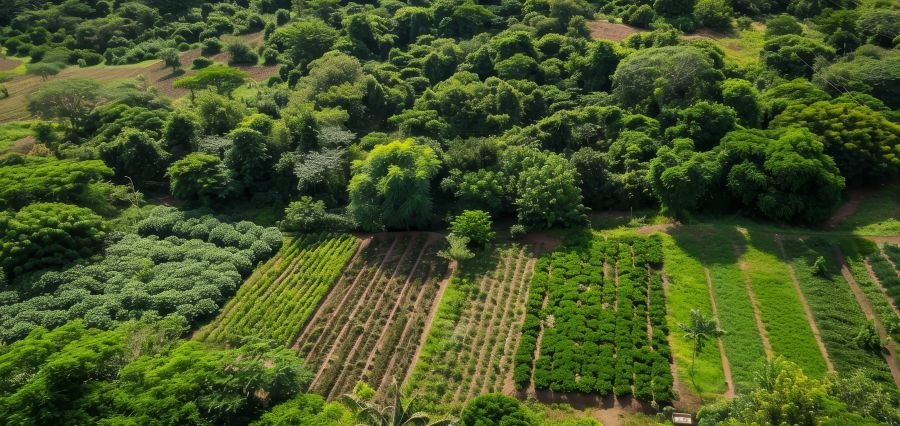Growing Green
Tamil Nadu, a state renowned for its rich agricultural heritage, is experiencing a notable transformation in its farming practices. As the world becomes increasingly conscious of environmental sustainability and health, Tamil Nadu is changing the norm and stepping towards progressive agricultural reform. The rise of organic farming and agroforestry in the state represents not only a shift towards environmentally friendly practices but also a broader movement towards sustainable living and biodiversity conservation.
Organic farming—characterized by the use of natural fertilizers and pest control methods—contrasts sharply with conventional farming methods that rely heavily on chemical inputs. This shift is driven by growing consumer demand for organic produce, which is perceived as healthier and more environmentally friendly. Agroforestry, the integration of trees and shrubs into agricultural landscapes, complements organic farming by enhancing biodiversity, improving soil health and providing additional income sources for farmers.
The correlation between organic farming and agroforestry in Tamil Nadu is evident in the way these practices are interwoven to address contemporary challenges in agriculture. Both approaches are instrumental in meeting the rising demand for organic produce while promoting ecological balance. Together, they represent a holistic strategy to improve agricultural productivity, environmental health and rural livelihoods.
Key Drivers of the Shift
Government Initiatives
Tamil Nadu’s government has played a pivotal role in promoting organic farming and agroforestry. Recognizing the importance of sustainable agriculture, the state has implemented various policies and subsidies aimed at supporting these practices.
Programs offering financial assistance for organic certification, as well as technical support for agroforestry projects, have been instrumental in encouraging farmers to adopt these methods. Government-backed initiatives also include training programs and workshops to educate farmers about organic farming techniques and the benefits of integrating agroforestry into their operations.
Consumer Demand
The increasing awareness and demand for organic food products among urban consumers have significantly influenced the rise of organic farming in Tamil Nadu. Urban areas, with their growing middle class, are becoming key markets for organic produce. Consumers are seeking food that is not only healthier but also produced using environmentally friendly methods.
This shift in consumer preference has created a lucrative market for organic farmers, incentivizing them to adopt practices that align with these demands. As a result, the organic farming sector is expanding rapidly to meet the needs of this discerning consumer base.
Climate Adaptation
Climate change poses significant challenges to agriculture, affecting crop yields and soil health. Organic farming and agroforestry offer valuable solutions to these problems. Organic farming practices, such as crop rotation and the use of organic fertilizers, help improve soil structure and fertility.
Agroforestry, on the other hand, enhances soil health through tree roots and organic matter and contributes to climate adaptation by providing shade and reducing soil erosion. Together, these practices help create a more resilient agricultural system capable of withstanding the impacts of climate change.
Specific Innovations
Integrated Farming Systems
One of the notable innovations in Tamil Nadu is the adoption of Integrated Farming Systems (IFS), which combine crop cultivation, animal husbandry and agroforestry. This approach maximizes resource use and productivity by creating a synergistic relationship between different agricultural components.
For instance, animal manure can be used as a natural fertilizer for crops, while trees in agroforestry systems provide shade and shelter for livestock. This holistic approach not only enhances overall farm productivity but also promotes sustainable land management practices.
Organic Certification Programs
To ensure the quality of organic produce and boost its marketability, Tamil Nadu has introduced various organic certification programs. These programs certify farms that adhere to strict organic farming standards, including the prohibition of synthetic chemicals and genetically modified organisms.
Certification helps build consumer trust and provides farmers with access to premium markets. By participating in these programs, farmers can differentiate their products and command higher prices, making organic farming a more viable economic option.
Farmers’ Markets
The establishment of organic farmers’ markets in urban areas is another key innovation. These markets serve as direct platforms for farmers to sell their organic produce to consumers, bypassing intermediaries and ensuring fair prices.
By fostering a direct connection between producers and consumers, these markets not only enhance the visibility of organic products but also create a community of consumers who are committed to sustainable living. This direct-to-consumer approach also helps farmers receive immediate feedback on their produce and adjust their practices accordingly.
Summation
The rise of organic farming and agroforestry in Tamil Nadu signifies a transformative shift towards sustainable agriculture and environmental stewardship. By embracing these practices, Tamil Nadu is not only meeting the growing demand for organic produce but also contributing to the conservation of natural resources and the enhancement of rural livelihoods. As the state continues to innovate and support these practices, the future of Tamil Nadu’s agriculture looks increasingly green and promising.






